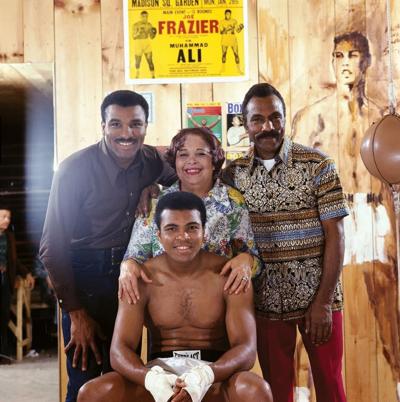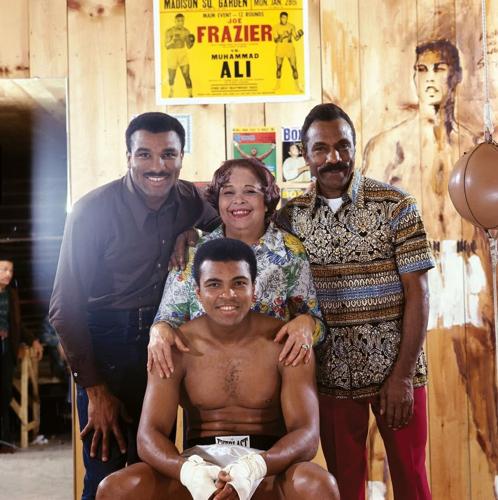LOUISVILLE, Ky. (WDRB) -- Before the world called him The Greatest, Muhammad Ali had a vision — and he shared it with his little brother.
“Rudy,” he’d say, “I can see it in the stars. God is talking to me. I’m gonna be the world’s greatest boxer. I’m gonna be a great man. And I want you to be with me.”
And Rahaman Ali was — in every way that mattered.
Rahaman, who remembered those words in the 2014 documentary I Am Ali, died Aug. 1 in Louisville at age 82. And with him goes a quiet but crucial part of Muhammad Ali’s story — a memory keeper, a guardian, a brother not just by blood, but by choice.
Born Rudolph Arnett Clay 18 months after Cassius Jr., Rahaman grew up in a modest two-bedroom home on Grand Avenue. The boys shared clothes, bunked in the same room, and stayed up late whispering dreams.
“We may not have had much money,” Rahaman later wrote, “but the fact that we had each other was typically enough to make us happy.”
They carried each other through poverty and into greatness. And they never stopped.
Rahaman boxed, too — turning pro the same night Muhammad fought Sonny Liston for the heavyweight title in 1964. That night, Rahaman won a bruising decision. But the crowd booed when they heard his name. He would win 14 of his first 15 pro fights and finished his career 14-3-1.
Rahaman remembered seeing his brother after that first fight. He’d been watching in the wings.
“Muhammad put his arm around me,” Rahaman wrote. “‘Rudy, that was your last fight. I’m going to take care of you for the rest of your life.’”
They were inseparable. At training camp. On the road. At the hospital. And when Muhammad made history, Rahaman was never far behind — his name on the undercard, his heart right there in the corner.
But Rahaman also carried deep pain.
He was there the day Muhammad threw his Olympic gold medal into the Ohio River — a moment long debated. Rahaman told his own story of the moment in My Brother, Muhammad Ali: The Definitive Biography, from which many of these memories are drawn.
Denied service at a Louisville diner because of his race, Muhammad left heartbroken.
“‘No, Rocky, I’m hurt,’” he told his brother. “‘I’ve been so disrespected. It hurts me bad.’ Next thing you know, I actually started to cry.”
"I don't think there was anyone who was closer to Muhammad than his own brother," Jim Brown wrote in the forward to Ali's book.
When Muhammad died in Scottsdale, Arizona, in 2016, Rahaman wasn’t there — not because he didn’t want to be, but because he couldn’t afford the flight.
“I cried,” he wrote. “My emotions were set off like fireworks. Losing a loved one can very easily plunge you into a state of desolation. I wanted to be left alone and grieve alone.”
But he held onto their final exchange — a gift.
“Rahaman, how do I look?” Muhammad had asked, hands shaking.
“You look the same to me,” Rahaman told him.
“I’m in no pain,” Muhammad said. “Don’t cry for me. I made peace with God. I’m OK.”
What the world didn’t know then — what even his agent didn’t fully understand — was that Rahaman was battling Parkinson’s himself. By the time of the funeral, it was already affecting his mood, his memory, his ability to cope.
“I was lost in my own little world,” he wrote. “Not thinking straight. I left not long afterward.”
He left with grief layered in regret — for the goodbye he missed, for the brother he’d never stop loving.
“You can’t tell Muhammad’s story without mentioning Rahaman,” said DeVone Holt, president of the Ali Center. “Their relationship was a true example of what it means to be ‘my brother’s keeper.’”
It was.
And though he never sought the spotlight, Rahaman Ali made sure it never went out.
He protected the name. He carried the flame. He wrote the stories others couldn’t.
Now that flame has dimmed. But the story? It shines even brighter.
Because wherever Muhammad went — the ring, the podium, the pain, the peace — Rahaman was never far behind.
Even now.
In her own tribute, Muhammad’s daughter Hana Ali remembered her uncle fondly — and pictured him once more by her father’s side:
“I can just picture them now, reunited in heaven… playing Cowboys and Indians with the broomsticks they used to find in Mama Bird and Papa Cash’s closet. Daddy always insisted on being the Cowboy, and Rock the Indian…
Whatever they’re doing up there, I know it’s full of joy, laughter, and the kind of brotherly love that helped shape our family.
He never needed a spotlight to shine. And now, from above, he and Daddy are part of something bigger… something beautiful.”
Copyright 2025 WDRB Media. All Rights Reserved.












